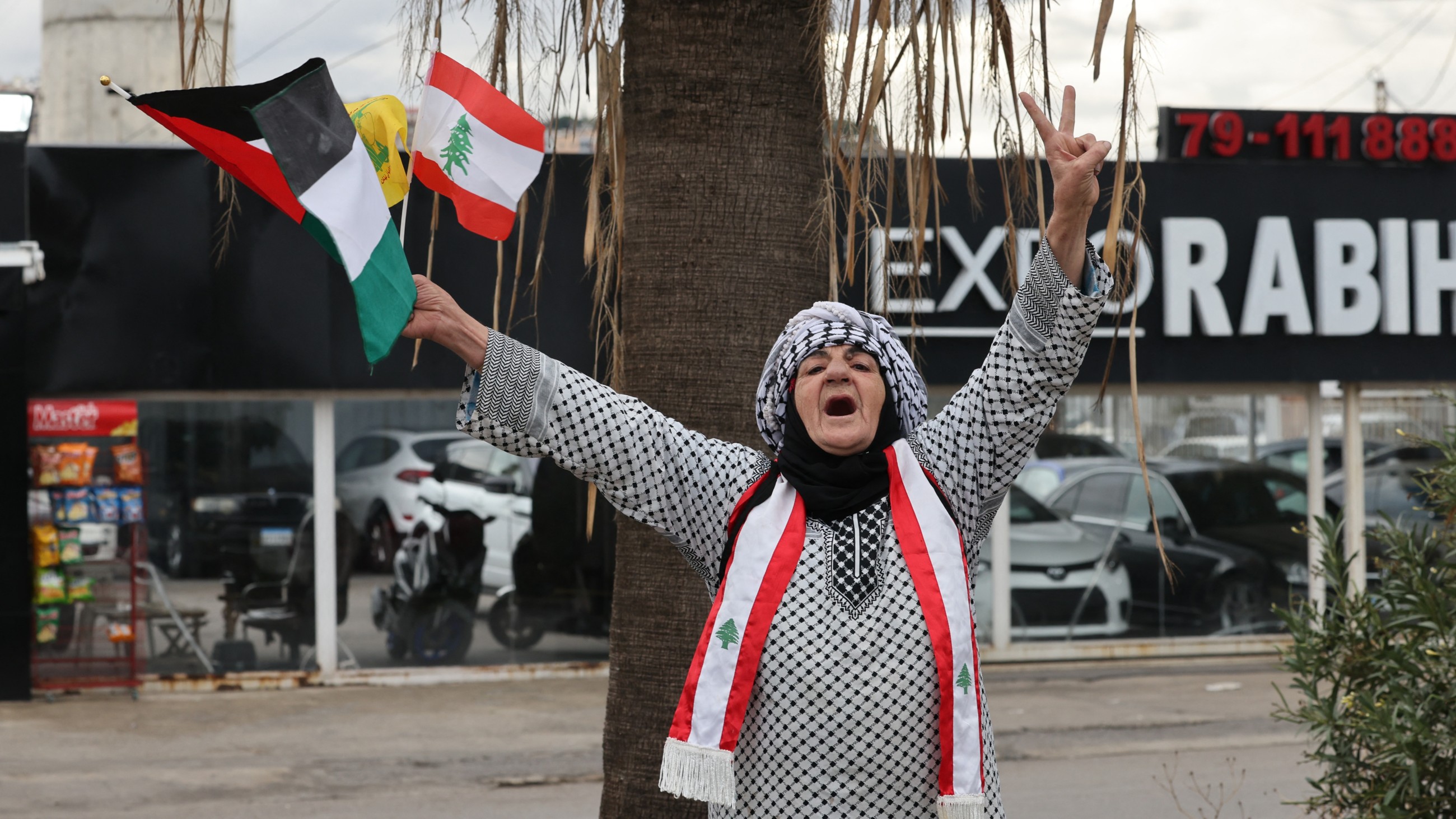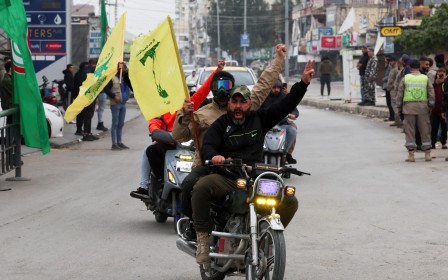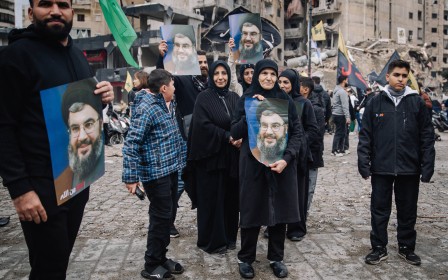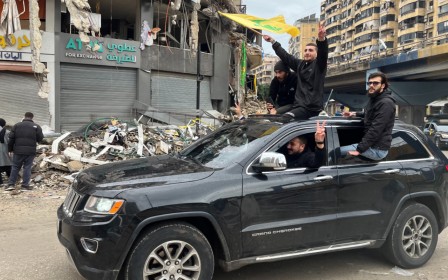Palestinians in Gaza join Lebanese in celebrating ceasefire on social media

As the ceasefire between Israel and Lebanon enters its first full day, Palestinians from Gaza have joined Lebanese in celebrating the deal online as they thank them for their solidarity in their fight against Israel.
Over 3,800 people were killed in Israel’s attacks on Lebanon over the past year, since hostilities began a day after the outbreak of the war on Gaza on 7 October 2023 after the Hamas-led attacks on southern Israel.
As the ceasefire went into effect in the early hours of Wednesday morning, social media was flooded with posts of Lebanese returning to their homes in the south, and those worldwide celebrating their homecoming - even in the Gaza Strip.
New MEE newsletter: Jerusalem Dispatch
Sign up to get the latest insights and analysis on Israel-Palestine, alongside Turkey Unpacked and other MEE newsletters
Alhamdulillah. No more killings in Lebanon. Lebanese people can now live in peace and calm.
— Abubaker Abed (@AbubakerAbedW) November 26, 2024
I feel like this news is ours, not theirs.
All love to the people of Lebanon. I wish every single one of them will live through eternal peace and happiness.
Journalist Anas al-Sharif also expressed his happiness, writing: "May God write for us in Gaza a quick relief, as He wrote for them, and may He have mercy on our martyrs and their martyrs, heal our wounded and their wounded, and return our absent and their absent."
Many online have said they see Hezbollah's agreement to the ceasefire as a signal that the group has been decoupled with the Palestinian cause. But many Palestinians in Gaza have expressed gratitude for those in Lebanon, not betrayal.
I have seen so many Gazans genuinely happy for Lebanon and its people and the most used phrases amongst them regarding this is كفّيتوا ووفّيتوا and ما قصرتوا which would translate to “You have fulfilled your part and more” and “You did not fall short”
— cheri 🔻 (@cheriblossom__) November 27, 2024
Palestinian journalist Hossam Shabat took to X to thank those in Lebanon from Gaza: "The world will witness that those who stood with us and supported Gaza were Lebanon and its people. In the darkest of circumstances, their positions were honorable and supportive, embodying the meaning of true brotherhood and solidarity."
While most posts coming out of Gaza are expressing their gratitude to Lebanon, others have asked what this means for the future of the besieged enclave, where conservative estimates say the death toll has reached at least 44,250.
One social media user posted: "I'm so happy that there will be a ceasefire in Lebanon because nobody deserves to experience death and displacement, but will we live to see a ceasefire in Gaza or is it just an impossible dream that will never come true?"
So happy Lebanon got the ceasefire, but here in Gaza, can someone tell us wtf is gonna happen? I'm crying fr, scared this might be our life forever. We’re stuck in this, and it feels like no one's listening.
— zinah𓂆 (@zhal80) November 26, 2024
Every day feels like we're just waiting for the worst, and Idk if…
In contrast, Moayed Harazen posted that the streets "are abuzz today with discussions about the end of the war in Lebanon" and that people are "filled with hope and optimism that this could mark the beginning of an end to the conflict in our own land".
"Just as the people of southern Lebanon returned home, we dream of returning to northern Gaza. We will celebrate, just as they celebrated their return, and we share in their joy."
I saw myself, my family, and my parents in the photos of Lebanese families returning home. I’m sure every Gazan, inside or outside, felt the same. I went through all the photos, one by one, pausing to absorb every detail. I liked each picture as if by doing so, I could send…
— Eman Basher (@SometimesPooh) November 27, 2024
The images that have sparked hope for many in Gaza continue to be posted online en masse as Lebanese return to their homes.
Displaced residents from Lebanon’s south are returning home after a ceasefire between Israel and Hezbollah went into effect on Wednesday.
— Middle East Eye (@MiddleEastEye) November 27, 2024
Many hope it will end over a year of fighting between Israel’s military and Lebanese Hezbollah, during which over 3,768 Lebanese were killed. pic.twitter.com/lyym6BgxP5
"Good morning from Houmine El Fawqa, Nabatieh District," one social media user posted, with a picture of a cup of coffee.
صباح الخير من حومين الفوقا قضاء النبطية. pic.twitter.com/0p6whyTIUr
— هادي (@hady_1c) November 27, 2024
Many posted that they found letters when they returned to their homes from Hezbollah fighters who used the house for food and shelter during the war.
One of the letters, accompanied by some money, reads: "Please forgive us for using your home, livelihood, and the supplies of the house. In order to maintain our good conscience, we decided to leave a modest amount of money as compensation. We hope you return to your beautiful home with your heads held high."
🇱🇧 #THREAD: The Honor of the Resistance: A Testament to Values
— Haidar Al-Karrar (@HaidarAkarar) November 27, 2024
In a humble home in southern Lebanon, where #Hezbollah fighters once stood to protect the land against the enemy, they left behind not just memories but a heartfelt letter—a reflection of their noble #انتصرنا
1/4 pic.twitter.com/JJr0NqP72b
As many posted pictures celebrating their homecoming, others have highlighted the level of destruction in the southern villages.
Massive destruction here in Bint Jbeil, first pictures after more than 2 months of Israeli bombardment.
— Nada Maucourant Atallah (@MaucourantNada) November 27, 2024
For many there is not much to return to. pic.twitter.com/JQfR9Xo3GW
Dr Ghassan Abu Sitta, who has treated patients in both Gaza and Lebanon, took to X to point out that many may never understand the Lebanese people's eagerness to return to their homes, which have been devasted, or Palestinians that remain in northern Gaza despite the immense danger.
That thing that binds indigenous people to their land. Makes 100s of thousands of Lebanese make their way back to their destroyed villages in the the South from the early hours of this morning. That makes Palestinians stay in northern Gaza despite the slaughter. The alien…
— Ghassan Abu Sitta (@GhassanAbuSitt1) November 27, 2024
Middle East Eye delivers independent and unrivalled coverage and analysis of the Middle East, North Africa and beyond. To learn more about republishing this content and the associated fees, please fill out this form. More about MEE can be found here.




